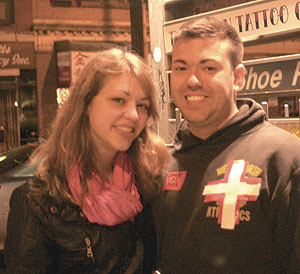
Former “Occupy Boston” occupier Devin Mack, with friend.
By Andrew Firestone
Devin Mack has had a transformational experience with the Occupy movement and he’s not giving up.
“I’m trying to find my place in society, being fresh out of the military,” said Mack who served in several branches of the military from 2005 to 2010. He says he tried college, going for criminal justice, but stopped a few credits shy of his paralegal. “Even if I get that, is there going to be any job opportunities for me?”
“They were actually a solid movement,” he said. “They were trying to do good for people like me.”
The son of a Somerville Fire Lieutenant, the Teele Square native joined the Occupy Boston camp at the end of October after witnessing the group in action. Mack was inspired by the message of the 99 percent: that society should work for the economic benefit of all people, not just a select few. A certified combat lifesaver, he acted as a medic at the camp, tending wounds and de-escalating conflicts.
Now, with the camp closed, he heads to Washington DC to support their occupy camp. It currently has three months on their permit.
For all the Somervilliens who chose to take part in the Occupy Boston movement in Dewey Square, this last week was a tough one. On the morning of Saturday December 10, the Boston camp, once a community of around 1000 individuals, was finally shut down following a gradual dispersal of the group. Of the 46 arrested by Boston police, 30 who remained are at trial, charged with trespassing and resisting arrest.
“As a whole, setting up a democracy down here is a political statement and it should be protected by free speech,” said Mack. “I served this country and I just don’t think it’s right.”
Mack said he quit his job at his father’s construction company and began sleeping at the camp. As one of the group medics, marked by red tape crosses on their sleeves, he said he wholeheartedly committed to the group, and served them by tending colds, bruises, cuts and looking after the group to see that everyone was safe and no one was cold.
“I fell in love with the people down there,” he said. “That’s me to the core. I love to help people.”
Much of Mack’s work ran into some sticky situations. Devin said that because of his work in the military, he often had to settle fights with some of the more unruly occupiers.
“Around 9 o’clock at night, it starts getting a little busier,” he said of his everyday activities. “People start drinking. It’s a sober movement, it’s supposed to be a sober camp, but what are you going to do?”
One member, whom Mack described as a “constant problem” was someone he called ‘George,’ who Mack had to settle one night.
“George constantly drinks,” said Mack. “George is constantly detoxing from alcohol. This particular night, George seemed a little more aggressive than usual, so we pulled him out of his tent. He was really, really agitated, really, really combative.”
“As soon as we pulled him out, he swings on me, so George goes down to the ground.”
“I say, ‘George, hey, it’s Devin’,” Mack continued, saying he had always had a good rapport with ‘George.’” “Ok, alright, I’ll be good,” ‘George,’ replied, and began cooperating.
“We get him halfway to the medical tent, George swings on me again, George goes down to the ground again. George hits me, he says: ‘let’s go!’ And he’s so out it, he’s not focusing at all. I do a quick heart rate on him. It’s at about 140, it’s really, really high.”
After calling a hospital, and getting George into detox once again, it was discovered that he had drank four bottles of Tussin cough syrup, which can have a hallucinogenic effect.
“He’s been a consistent problem since then, too,” said Mack.
However, it was not all fights with drunkards and marches. Mack met his girlfriend, Tufts student Anne Wolfe, at the camp one morning.
“I see this little blonde girl running around, cleaning the tent that’s next to us,” he recalls. “Wow, she’s kind of cute, she’s cleaning, she’s doing actual work. What is she’s doing down here? No one does actual work around here.”
He said hat he made fun of her while she was cleaning, telling her she was doing everything wrong. “We built a good working relationship first, I’d say, and then feelings developed out of that,” he said.
“She’s a Tuft’s student, I’m a Somerville kid. We don’t get along, usually,” he said. “It crossed the social divide, where I actually opened up and was able to talk to her, and not just be like ‘I hate Tufts students.’”
Wolfe recalls that, indeed, his first reaction upon learning her educational background was “Oh my god, I hate Tufts.”
“Just because the camp goes away, doesn’t mean the issue goes away. Now that people know about them, we need to act on them,” he said. “Something like this, I think, was a longtime coming, and it’s weird that this is how it manifested but it’s good. It’s inspirational.”
Mack said while he supported the movement, which has suffered setbacks in recent months due to a nationwide crackdown on their camps, he did not have the answers to how to fix the socio-economic problems the group tried to address.
“I can fix cuts and scrapes and bruises and colds. I can’t fix the economy. I’m there to take care of the people who can, who know how to do that.”















Reader Comments